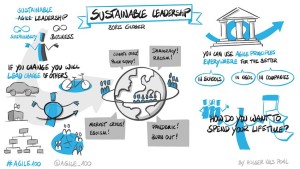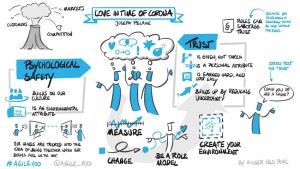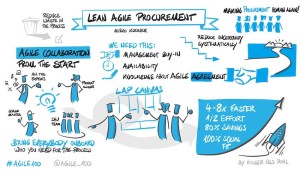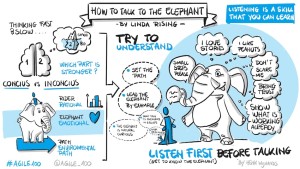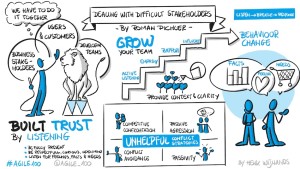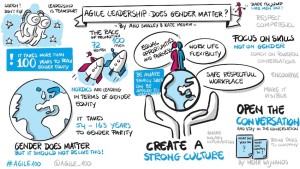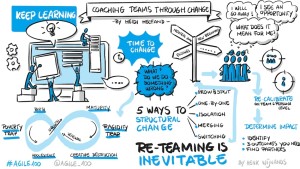Agile100 June 2020 Recap

The Agile100 conference is a monthly event series that brings together the top 100 agile thought leaders on a world stage. Each month, a group of hand-picked international thought leaders appear at this remote conference to share best practices, ideas, philosophies and the latest developments in the agile world. In this article we’ll summarize the June Agile100 event (agile100 May Event Recap) and give you an overview of the eight experts, their presentations, and a visual summary. Video recordings of the presentations will be published regularly on the Agile Academy YouTube channel and within the Agile Insights.
The speakers and the schedule at the June event
After the first edition of Agile100 in May 2020 was a complete success with over 200 enthusiastic participants from all over the world, the second edition has already attracted more than 300 international visitors. Encouraged by the positive feedback of the participants, the schedule and the Coaches Clinic was changed a little between the first and second conference. Between eleven and eight o’clock there were now eight speakers who presented their topics in seven sessions. In between there were two bigger breaks for the visitors of the Coaches Clinic and smaller breaks for personal exchange or “self-catering” at home.
The following speakers and agile masterminds were part of the 2nd agile100:
- Boris Gloger (Founder, Owner & CEO borisgloger consulting GmbH): Sustainable Leadership
- Joseph Pelrine (Agile Psychologist, Owner MetaProg GmbH): Love in the Time of Corona
- Mirko Kleiner (Co-Founder & Board Member flowdays): Lean-agile Procurement
- Linda Rising (Independent Consultant and COO The Hillside Group): How to talk to the Elephant
- Roman Pichler (Owner Pichler Consulting): Dealing with difficult stakeholders
- Kate Megaw (President The Braintrust Consulting Group) and Anu Smalley (Member & President Capala Consulting Group LLC): Agile Leadership – Does Gender Matter?
- Heidi Helfand (Director of R&D, Excellence Procare Technologies): Coaching Teams Through Change
Sustainable Leadership
The first lecture of the day, entitled “Sustainable Leadership”, was given by Boris Gloger. His lecture and the subsequent Q&A gave the audience exciting impulses and challenged the creativity of the audience.
In his session Boris brought a lot of ideas with which you can do a lot for the sustainability of your company and your fellow men in a very simple way. An introductory example was the 17 sustainability goals of the United Nations. His approach is that if everyone tried to work towards these goals on their own, the world would be a better place every day.This started with the use of renewable energies & green electricity in the office and went on to equal rights (which will be discussed again later) and climate protection measures. For example, gloger consulting avoids flying whenever possible and Boris travels with his folding bike to conferences & meetings in order to save on taxi rides.
All in all a very exciting approach that gave every listener the chance to set 17 possible and above all sustainable goals with his company and in his private life. (More on the Sustainable Development Goals in a bunch of languages: UNRIC)
See his presentation about Sustainable Leadership.
Love in Times of Corona – Psychological safety, trust, and the cognitive dissonance of virtual environments
Directly afterwards Joseph Pelrine took over the sceptre and entered his lecture “Love in the Time of Corona” with probably the most entertaining opening slide of the day.
As a psychologist, Joseph Pelrine has always been fascinated by the application of agile methods and ways of thinking in his daily work. Due to his current support and advice to medical personnel in fighting Covid-19 (Link to the Johns Hopkins Coronavirus Resource Center), he gave the audience very exciting insights into the agility of psychological work and the fact that treatment methods have to adapt quickly to the circumstances.
During his presentation, Joseph went through the issues that were “corona-induced” and gave examples and ways to get out of them. Not only did he conduct ad hoc surveys among the participants, creating a very interactive session, but he also added the appropriate medical and psychological symptoms and current quotes on how to deal with and overcome these obstacles.One of the points was distance and alienation through virtual measures, which had to be faced. For example, he cited a quote from Petriglieri (2020), which states: “Social media was practice. This is the real game. We’re not just learning new tools. We must re-learn how to be with each other. Or we lose. And being an existential game, what we lose is our self – if not our life.”
Watch Joseph Pelrine’s Presentation.
Psychological Safety in Virtual Environments (PDF Download 1,1 MB)
Lean-Agile Procurement – Speed Dating for Business
Mirko Kleiner showed afterwards how sexy the agile procurement of products and services can be. In his view, this lean approach requires a number of factors and above all the willingness and radical mindshift of the participants.
In his opinion, a certain degree of uncertainty must be accepted and cross-functional collaboration must be assumed. Only under this agile contract is it possible to institutionalize lean-agile procurement. With the help of a cross-functional team and the support of the stakeholders, much faster and more targeted procurement cycles are possible.
Recording: Lean-Agile Procurement with Mirko.
How to talk to the Elephant
Right after the first big break it was time for system 1 and system 2 with Linda Rising. Her lecture with the philosophical title was aimed at the conscious and unconscious in humans, as well as the resulting relationships and pronunciation between people.
Her lecture was a captivating metaphor about an elephant (the emotional consciousness) and its rider (the rational consciousness) on their common path (environmental influences).
The essence of the lecture was that we have to learn again to understand others and above all to want to understand them. After all, we would first have to understand ourselves what others feel and think if we wanted to try to convince them of our ideas. By ignoring these feelings and ways of thinking, one would inevitably contribute to a further distance between people. Especially because of the current political situation in the USA, she said, it would be harder and harder to understand the “other” position, if one would not deal with it urgently beforehand.
Watch Elephants with Linda.
Dealing with Difficult Stakeholders
Roman Pichler resorted to another metaphor in his lecture and introduced “Sophie” to the audience. Sophie is the difficult stakeholder at senior management level who makes life difficult for the product owner in his narrative.
Listening also has a special meaning in Roman’s performance. Using the Behavioural Change Stairway Model and three tips for listening, he explains in a very practical lecture how to be a leader in product management.
Learning how to solve a conflict is therefore the most important quality for a product owner, according to Roman Pichler.
See the Recording of Dealing with Difficult Stakeholders!
Agile Leadership – Does Gender Matter?
Anu Smalley & Kate Megaw gave an exciting overview of the topic of equality and gender diversity. They listed several facts that captivated the audience and led to lively discussions. For example, one of the findings was that, given current trends, it would take more than 100 years for women to achieve equality with men at C-level.
They also conducted their own research to find out what leads to these differences. What was exciting here was that women in particular would decide against a leadership position if it had a significant impact on the family. This is an issue that is hardly noticed in Scandinavian countries such as Iceland, Norway, Finland and Sweden. This is where the gender gap is least developed.
Therefore, the path to gender equality is significantly shorter here at 54 years of age than, for example, in North America at 151 and East Asia and the Pacific states at 163.
Gender Parity Recording of the Agile100
Coaching Teams Through Change
Finally, Heidi Helfand was allowed to give the last lecture of the evening. With Coaching Teams Through Change as well as the Liberating Structures she offered an exciting view of Gunderson & Holling in addition to the general team model of Tuckmann.
Her introduction to panarchism and the possibility to connect people and teams on different levels gave the evening a truly round ending.
Heidi described what kinds of structural changes happen in teams and what effects they can have on the development of teams. In this sense, Tuckman’s model does not go far enough for her, since the smallest changes in team composition and team maturity in turn have an effect on performance and group structure.
